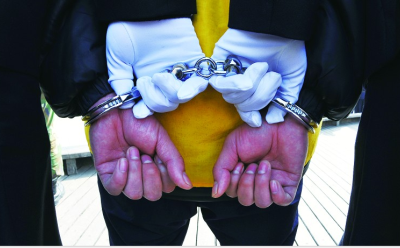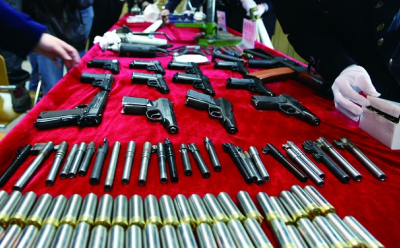The War Against Chongqing Triads
Nation, page 9
Issue 433, August 24, 2009
Translated by Tang Xiangyang
Original Article: [Chinese] Fears beset the rich and powerful in Chongqing of late, as millionaires, people's representatives, police chiefs, and judicial officials have been rounded up alongside loan sharks and gangsters in an ongoing campaign against organized crime gangs and their protectors.
Fears beset the rich and powerful in Chongqing of late, as millionaires, people's representatives, police chiefs, and judicial officials have been rounded up alongside loan sharks and gangsters in an ongoing campaign against organized crime gangs and their protectors.
Who will be the next prominent figure to fall under sweeping investigations and enthusiastic public tip-offs? This has become a favorite guessing game amongst the locals.
Set in China's hilly southwest region, Chongqing is the most populated Chinese city and it has a long tradition of triad members exerting great influences in businesses, politics, and beyond.
Since June, however, the local government launched a crackdown, known locally as the "campaign against the dark forces"; by early August, a long list of notable local figures were lining up behind bars. Among the 1,544 arrested under the campaign thus far, over 50 were government officials.
Public tip-offs had played a key role in the campaign, according to statistics released by the local Public Security Bureau (PBS), the public provided over 6,700 leads and tip-offs in about a month.
"I have not seen such appreciative public in many years, not since the police busted a notorious children smuggling ring," said a two-decade-long-in-service officer of the crowds, among them community leaders and corporate figures, who had gathered in the city PBS headquarters one afternoon to thank and show support for the campaign.
Trades, Triads & Tyrants
If the arrest of local business tycoons such as Li Qiang, Chen Mingliang and Gong Gang, was the climax of this unfolding drama, then the downfall of Wen Qiang - former police chief and judicial official - was the crowning moment for the campaign.
Li Qiang, the second wealthiest man in Banan, held numerous titles. He was in the local legislative system as a member of the Chongqing Municipality National People Congress (NPC), and standing committee member of the Banan district Chinese People's Political Consultative Conference (CPPCC); Li was also influential in business community as the chairman of the Banan District Chamber of Commerce.
Before his arrest, Li was deemed a model businessman, appeared to be championing local welfare and fighting against discriminatory rules for private businesses; In 2006, Li sued the Chongqing Transit Bureau for unfair bidding regulations, claimed that the process favored state-owned companies in wining bus route operations along Qianyu Highway.
Li owned over 20 companies, created some 3,000 jobs, and paid huge corporate taxes. The Chongqing Yuqiang Group under his name invested in multiple trades, including bus and taxi services, real estate development, property management, driving schools, car rental businesses, car maintenance services and more. Sources claimed the Group's assets worth some 2 billion yuan.
Police investigations later revealed that Li had used gangster tactics to threaten competitors and carve up major market share in various sectors.
After Li's detention, his companies had been placed under tight scrutiny by the authorities, though business operations continued to run under the care of a "special task group", according to management personnel at Yuqiang Group.
One Yuqiang manager told the EO that nearly all upper management-level personnel had been approached by the police for investigations. "One can hardly call this business as usual," said the manager, adding staff were feeling tensed and worried.
 The Protective Umbrella
The Protective Umbrella
Sources claimed that shortly after Li was detained, many short messages flooded his mobile phone, urging him to flee the city. Police investigations reportedly revealed that some of the messages came from police personnel, suggesting his close ties with the police force and possibly backed by them in many of his endeavors.
Soon after Li's arrest in late July, came the downfall of Wen Qiang on August 8.
Following his arrest, the local authorities named Wen as the biggest "protective umbrella" for the mafia activities in Chongqing.
Wen, 54, and Li came from the same hometown. His resume was impressive -- he joined the police force in 1972 and gradually rose up the rank. In 1997, he was named the deputy police chief of Chongqing; and later in 2008, he was appointed as the chief of Chongqing Judicial Bureau.
In fact, Wen was not the first senior-ranking policeman in Chongqing suspected of "protecting" triads.
In 2002, another former Chongqing police chief Li Hong was sentenced to seven years in jail for shielding organized crime gangs and taking bribes. The other three high ranking officers involved in the same case were also sentenced to jail, between one and 14 years.
In the latest crackdown, police claimed to have wiped out 47 organized crime gangs. Police also vowed to do house cleaning and weed out the bad apples from within the PBS.
For deterrence, no paroles nor reduced penalty would be extended to convicted organized criminals and their protectors, according to local officials.
The views posted here belong to the commentor, and are not representative of the Economic Observer |
Related Stories
Popular
Briefs
- OPhones to Take on iPhone
- The 3G-enabled Lenovo Mobile OPhone is likely to provide stiff competition to Apple's iPhone in the China market.

- Source:China Mobile
- 6.4-Magnitude Quake Rocks West China
- A 6.4-magnitude earthquake struck China's western Qinghai province earlier this morning.
- Source:China Earthquake Networks Center

- TAX
- Taxing Times
- China's tax bureau aims to collect an additional 100 billion in tax before the end of the ...




















